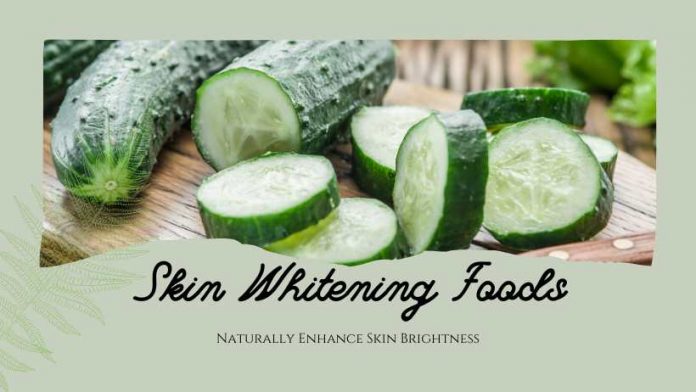Dabbing on skin-whitening serums or skin-lightening creams will not help you achieve naturally brighter and fairer skin. Though such skin products are a great addition to your regular skincare regime, they are formulated to enhance your skin’s elasticity and firmness. Yet, eating foods loaded with skin-whitening vitamins and nutrients with help you achieve glowing and radiant skin with time. You can see the visible effects of these natural foods while getting a beautiful and healthier complexion.
It’s time to unleash your inner beauty as we delve into the significance of skin nutrition and explore top skin-whitening foods. Make sure to include these foods daily, and watch them rejuvenate and illuminate your skin.
Importance of Diet in Achieving a Brighter and Radiant Complexion
The food you consume not only has a significant effect on your overall health but also enhances your skin health. A balanced diet will impart a healthy glow to your skin and protect against infections. Avoid eating processed foods regularly, as their altered ingredients can lead to reddishness and blemishes.
A diet with wholesome and organic foods with less sugar will keep skin issues like pigmentation at bay. While several factors will improve the health and appearance of the skin, incorporating foods with skin whitening prowess will help you get naturally glowing skin. If you plan to enhance your skin’s complexion, creating a diet plan with skin-whitening foods is an excellent way to start. Read on to know which foods can nourish you from the inside out while helping your skin glow with natural radiance.
Understanding Skin Pigmentation
Skin pigmentation refers to your skin colour, which is determined by the type and amount of melanin pigment produced by the skin, called melanocytes. Fluctuations in melanin production lead to several pigment disorders like depigmentation – white patches, hypopigmentation – light spots, and hyperpigmentation – dark spots. Genetic factors, autoimmune conditions, sun exposure, blisters, and acne influence melanin production and cause skin pigmentation. Consuming pomegranates and papaya, rich in polyphenols, phytochemicals, vitamins, enzymes, and beta-carotene, will help prevent hyperpigmentation.
Foods like fish have abundance of omega-3 fatty acids. They effectively lower melanin production and heal sun exposure-induced hyperpigmentation. Carrots are loaded with skin-friendly phytochemicals and antioxidants to lessen the effects of hyperpigmentation and protect against sun exposure damage. Green vegetables loaded with carotenoids reduce oxidative stress and prevent facial dark pigmentation. Citrus fruits contains vitamin C, which helps lower hyperpigmentation and dark spots. Anthocyanin-loaded foods like sweet potatoes combat free radical activity to prevent blemishes and dark spots.
Role of Antioxidants in Skin Whitening
Antioxidants enhance skin health by protecting against damage induced by free radicals. These free radicals are unstable molecules, which damage skin cells, and cause ageing and skin diseases[1]. Antioxidants neutralize the free radicals to make them non-toxic and stable[2]. Listed below are the 8 best antioxidants essential for bright and glowing skin.
Curcumin
This potent antioxidant is abundant in turmeric, known for its healing properties. It protects your skin from severe UV radiation damage and helps lower inflammation, has antimicrobial properties, and enhances wound healing. It keeps skin free from infections and helps to have a healthy glow.
Vitamin A
This vitamin is known for its combating ability to ward off free radicals[3]. It also aids in collagen production, which enhances skin strength. With age, the level of collagen lowers and causes sun spots, scars, dark spots, and fine lines. With vitamin A[4], you can cut down the appearance of these signs of ageing. Retinol, retinaldehyde, retinoic acid, adapalene, and tretinoin are various forms derived from Vitamin A. Retinol is a powerful ingredient widely used in anti-ageing products.
Catechines
A potent form of polyphenols commonly found in green tea, catechins can fight against the skin damage caused by free radicals. This antioxidant prevents your skin from ageing by lowering visible wrinkles and fine lines. It also contains the risk of developing skin cancer and other infections while improving skin colour.
Flavonoids
This plant-derived antioxidant is a form of polyphenols that protects your skin against UV damage. It lowers the impact of direct sunlight on your skin and its effects like pigmentation, sunburns, acne, and quick ageing. It is found in white tea and prevents skin damage caused by pollutants and other environmental factors.
Resveratrol
This powerful antioxidant is also a type of polyphenol that protects and repairs your skin from the effects of environmental stressors[5] and other factors. It is present in the peel of red grapes and enhances skin glow by keeping the effects of particulate matter and pollution-backed free radical damage at bay. Vitamin E
This underrated skin vitamin is a powerful antioxidant vital in brightening your skin and maintaining health. It carries the youthful factor of the skin by shielding it against the effects of polluting factors while improving its health. It is a nourishing, protecting, and soothing antioxidant that pampers your skin with a healthy and natural glow from within.
Lycopene
Primarily found in red-coloured vegetables like tomatoes, lycopene, a form of carotenoid, is pivotal in safeguarding your skin against UV rays. It enhances collagen production and is quickly absorbed by your body. It also prevents clogged pores and breakouts on your skin while imparting a visible glow.
Vitamin C
Popularly called the skin-brightening antioxidant, it keeps your skin healthy, glowing, and radiant. Vitamin C[6] creates a protective barrier to protect your skin from external and environmental factors to prevent damage by free radicals while promoting collagen production naturally[7]. It has hydrating properties to maintain the youthfulness of your skin.
Top Foods That Promote Skin Whitening
1. Cucumber
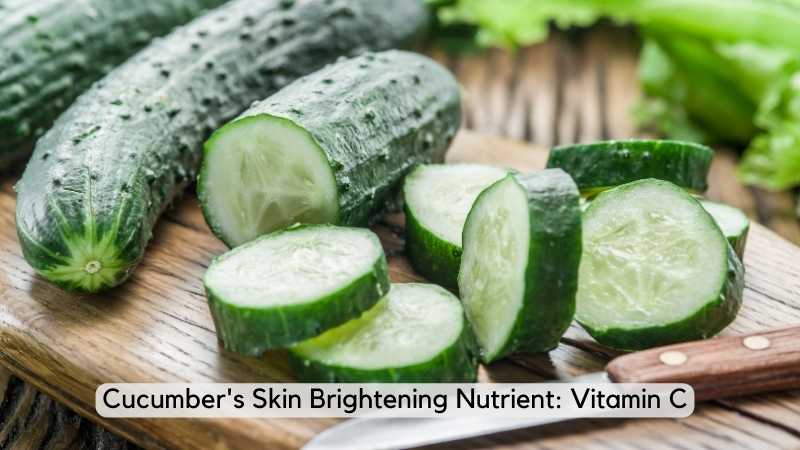
Cucumber’s Skin Brightening Nutrient: Vitamin C
Surprising! Isn’t it? Cucumbers constitute about 96% of water content, so eating them regularly will keep your skin well-hydrated. Cucumbers are rich in antioxidants and have a cooling effect on your body[8]. The cucumber is loaded with potassium and magnesium, while its peel is rich in Vitamins C and K. This vegetable has a vital role in promoting the glow and health of your skin. It has a soothing effect on skin irritations and sunburns while lowering swelling. It encourages the brightness of your skin by flushing away the toxins from the body.
2. Orange
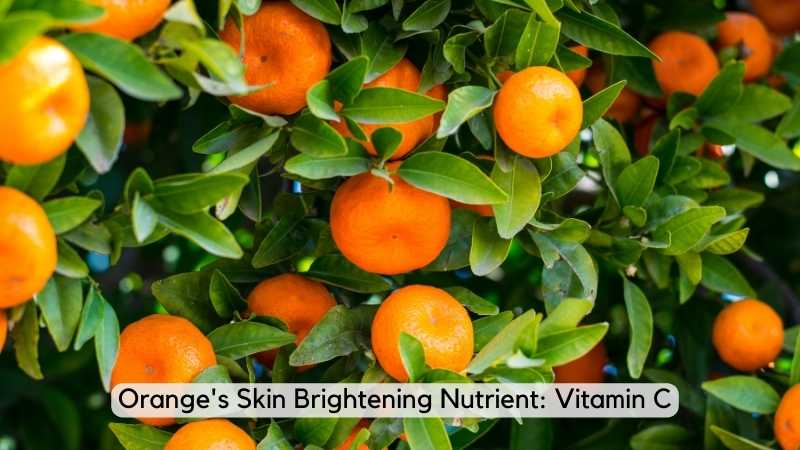
Orange’s Skin Brightening Nutrient: Vitamin C
As you age, your skin tone diminishes and becomes spotty, dry, and pale. Photoaging and age spots induced by exposure to sunlight causes your melanocytes to increase melanin production. But, with orange fruit, it is possible to reverse the effects of ageing and tone down the effects of sun damage[9]. Loaded with Vitamin C, this fruit gives immense skin strength. It is rich in antioxidants[10], which neutralize the free radicals, thereby protecting DNA and preventing the ageing process.
3. Sesame Seeds
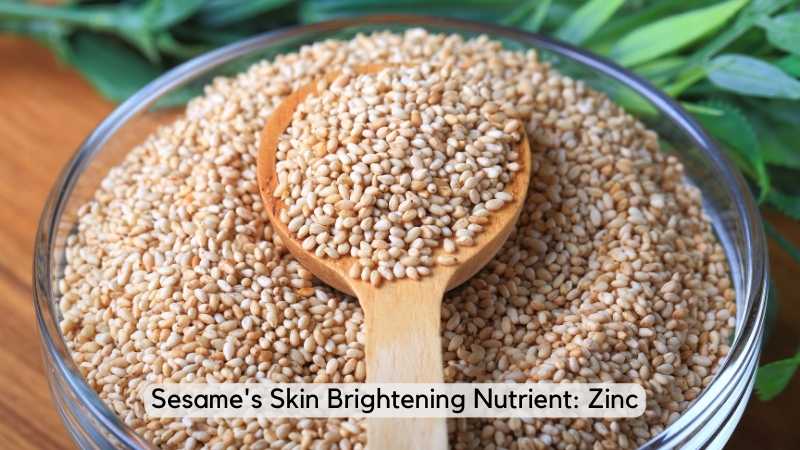
Sesame’s Skin Brightening Nutrient: Zinc
Sesame seeds are loaded with many minerals and vitamins, making them a must-have superfood for the skin. It has Vitamins B and E, phosphorus, iron, magnesium, and calcium. Sesame seeds are packed with zinc. Zinc helps improve collagen production, which is essential for firm and supple skin. Using it as a part of your everyday diet will help maintain healthy skin by flushing out toxic waste. It can beautify you from the inside by glowing naturally.
4. Carrots
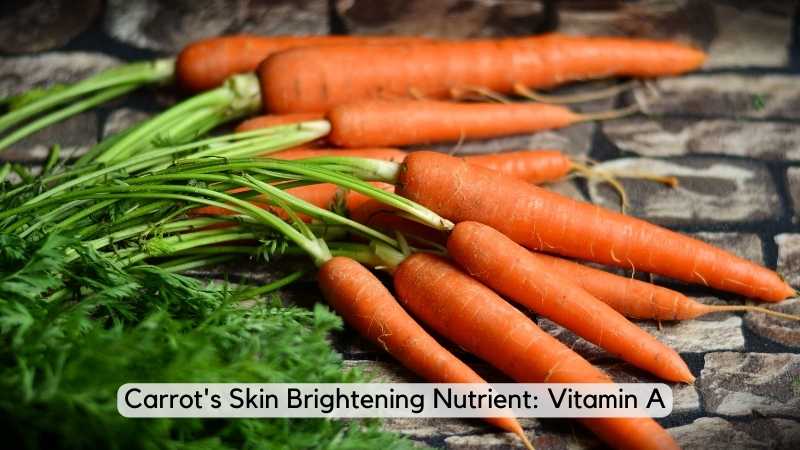
Carrot’s Skin Brightening Nutrient: Vitamin A
Your body consistently makes new skin cells once every 28 days, with 1.6 billion cells in your body. Consuming carrots will help support cell growth and stay assured of flaunting beautiful skin naturally that glows with health[11]. The presence of vitamin A in carrots helps in enhancing cell differentiation. It has phenolic acids, flavonoid[12] and beta carotene that prevents free radical damage and eliminates blemishes and dark spots. As your body changes beta carotene into Vitamin A[13], eating a carrot every day will help you glow with radiance.
5. Sardines
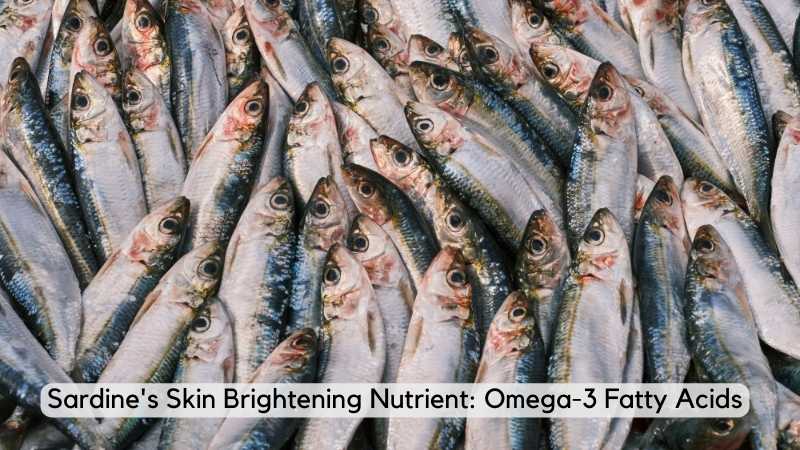
Sardine’s Skin Brightening Nutrient: Omega-3 Fatty Acids
Though you might be aware that Omega-3 fatty acids are essential for your cardiovascular system, you might be surprised to know it helps keep the skin healthy. Your skin achieves radiance and glow when the blood vessels stay healthy. This is where the omega-3 fats of sardines come in. Study shows that omega-3 fatty acids are beneficial for your sebaceous glands, which helps improve psoriasis and acne[14]. It also lowers skin inflammation, redness, and puffiness[15]. You can also include fatty fish types like anchovies, mackerel, tuna, and salmon in your diet regularly, as they are loaded with this skin-friendly fat. If you are a vegan, you can find omega-3 fats in chia seeds and flax seeds.
6. Kale
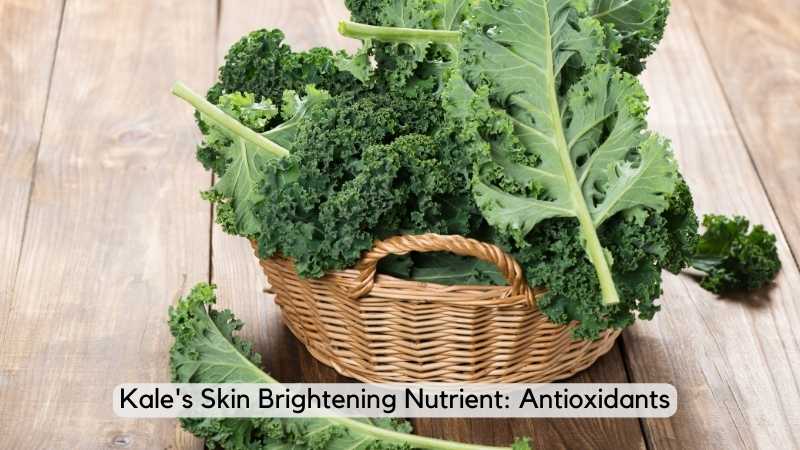
Kale’s Skin Brightening Nutrient: Antioxidants
Freckles, moles, and age spots caused by sun exposure can ruin the way your skin looks. Combat the effects of sun rays by including green leafy vegetables like kale, as it is loaded with more than 45 variants of antioxidant compounds named flavonoids[16]. Toss it in your salads, and bake it in the oven to make kale chips if you don’t like its earthy flavour. It is rich in vitamins K, E, C, and A to help quick healing and blood clotting while helping skin whitening. Kale is an abundant source of carotenoids like beta-carotene, which is essential for overall skin health[17].
7. Avocado
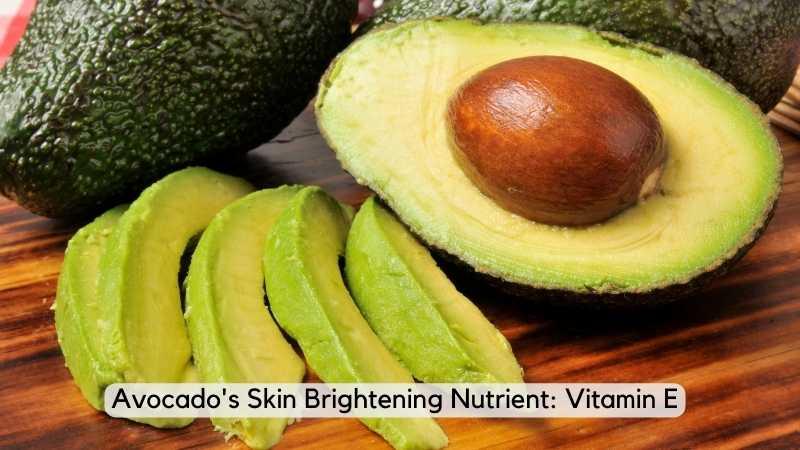
Avocado’s Skin Brightening Nutrient: Vitamin E
Avocados possess anti-inflammatory properties that help to prevent the effects of oxidative stress. This skin-friendly fruit contains vitamins B6, B3, K, C, and A. It also contains zeaxanthin, lecithin, potassium, and lutein to protect against UV damage while offering a brighter skin tone. This fruit has wound-healing and skin-firming properties[18]. It has monosaturated fatty acids to keep the skin hydrated and prevent premature ageing and the effects of UV rays. The avocado seed is a powerhouse of catechin[19], which aids in skin brightening.
Lifestyle Habits That Support Skin Health
- Get 8 hours of sleep each night to promote skin renewal and cell repair.
- De-stress by focusing on activities that you love and enjoy, both mentally and physically, as stress can cause your skin to age quickly.
- Hydration is the key to achieving young and bright skin. Drink up to 8 glasses of water to replenish the lost moisture.
- Keep moving by regularly exercising or doing yoga to boost circulation and promote skin metabolism.
- Eat a colourful variety of vegetables and fruits three times a day to prevent cellular damage and nullify the effect of free radicals.
- To prevent skin pigmentation, use sunscreen whenever you go out.
- Cleanse your face thoroughly after waking up and before going to bed to remove dirt, sweat, and pollutants to prevent irritation and skin inflammation.
- Have a simple skincare routine like cleansing, moisturizing, and exfoliation to cater to your skin’s needs.
Genetic Factors Influencing Skin Color
You will be amazed that around 125 genes influence your skin color. Apart from hormones, your genes, too, have a significant role in regulating melanin production. The presence of the melanocyte number is predetermined through genetic factors. But, tanning and hyperpigmentation influence the transfer and increase in the melanosome organelles, which have melanin. Your genes are capable of adjusting the amount of pheomelanin[20] and eumelanin produced by the skin cells and determining their survival rate as well as function. Such activities of your genes cause a change in your skin colour with time[21].
The variations in your skin colour reflect your ancestors’ evolutionary adaptations dating back to about 300,00 – 1 million years. As the ancestors moved outside and within the African region[22], lighter skin and darker skin tones had the following benefits.
- Lighter skin-toned people produced more amount vitamin D despite living in regions with less sunlight.
- Darker-skinned people had natural protection against harmful UV rays despite living in areas with strong sunlight.
Final Thoughts
Try different methods like drinking fruit juices and following a strict diet with skin-brightening foods to give your nourished skin a bright aura without any makeup. But, if there are no visible differences even after trying for several months, then contact Kolors Healthcare for effective skin whitening treatments backed by safe methods and the latest technology.
References
- Laboratory for Oxidative Stress Research, Faculty of Health Sciences, University of Ljubljana, Zdravstvena Pot 5, 1000 Ljubljana, Slovenia – https://www.ncbi.nlm.nih.gov/pmc/articles/PMC3299230/
- Flavia Alvim Sant’anna Addor, R. Attilio Delanina, 187, Osasco, 06023-000 São Paulo – https://www.ncbi.nlm.nih.gov/pmc/articles/PMC5514576/
- Department of Cosmetic Raw Materials Chemistry, Faculty of Pharmacy, Medical University of Lodz, Lodz, Poland – https://www.termedia.pl
- A M Kligman, O H Mills Jr, J J Leyden, P R Gross, H B Allen, R I Rudolph – https://pubmed.ncbi.nlm.nih.gov/6453848/
- Department of Histology and Pathology, Faculty of Medicine, University of Málaga, Málaga, Spain – https://www.frontiersin.org/articles/10.3389/fphar.2019.00759/full
- Department of Pathology, University of Otago, Christchurch, P.O. Box 4345, Christchurch 8140, New Zealand – https://www.ncbi.nlm.nih.gov/pmc/articles/PMC5579659/
- Pattarawan Rattanawiwatpong MD, Rungsima Wanitphakdeedecha MD, MA, MSc – https://onlinelibrary.wiley.com/doi/10.1111/jocd.13305
- School of Natural Product Studies, Department of Pharmaceutical Technology, Jadavpur University, Kolkata – https://pubmed.ncbi.nlm.nih.gov/23098877/
- Department of Drug Sciences, University of Catania, Catania, Italy – https://pubmed.ncbi.nlm.nih.gov/24910279/
- Department of Gerontology, Geriatrics and Physiatry; Catholic University of Sacred Heart, Rome, Italy – https://www.ncbi.nlm.nih.gov/pmc/articles/PMC2685276/
- Sara Arscott, University of Wisconsin–Madison – https://www.researchgate.net/
- Department of Plastic and Reconstructive Surgery, Shanghai 9th People’s Hospital, School of Medicine, Shanghai Jiao Tong University – https://www.ncbi.nlm.nih.gov/pmc/articles/PMC4503966/
- Nancy Shute – https://www.npr.org
- Department of Traditional Chinese Medicine, Chang Gung Memorial Hospital at Keelung, Keelung 20401, Taiwan – https://www.ncbi.nlm.nih.gov/pmc/articles/PMC6117694/
- Department of Dermatology, University of Occupational and Environmental Health, Kitakyushu, Japan – https://www.ncbi.nlm.nih.gov/pmc/articles/PMC7892455/
- Tecnologico de Monterrey, Escuela de Ingenieria y Ciencias, Av. Eugenio Garza Sada 2501 Sur, Monterrey, Nuevo – https://www.ncbi.nlm.nih.gov/pmc/articles/PMC8706317/
- Bioactive Food GmbH, Am Ihlsee 36a, 23795 Bad Segeberg, Germany – https://www.ncbi.nlm.nih.gov/pmc/articles/PMC5537889/
- Susanne M. Henning PhD, RD, Jeraldine B. Guzman BA, Gail Thames BA, Jieping Yang PhD – https://onlinelibrary.wiley.com/doi/full/10.1111/jocd.14717
- N.P. Linda Laksmiani, Udayana University – https://www.researchgate.net/publication/
- Alessandra Napolitano, Lucia Panzella, Giuseppe Monfrecola, Marco d’Ischia – https://onlinelibrary.wiley.com/doi/10.1111/pcmr.12262
- L’Oreal Research and Innovation, 1 avenue Eugene Schueller, 93601 Aulnay-sous-Bois, France – https://www.mdpi.com/1422-0067/19/9/2668
- Department of Genetics, Perelman School of Medicine, University of Pennsylvania, Philadelphia, PA 19104, USA – https://www.science.org/doi/10.1126/science.aan8433

